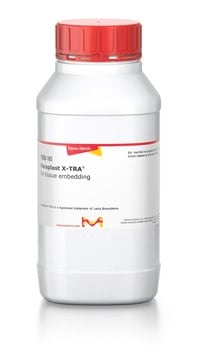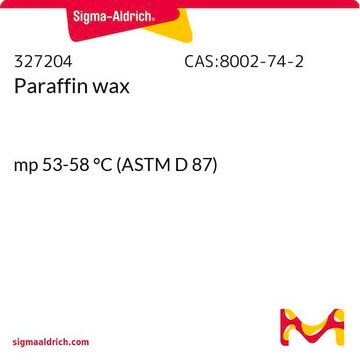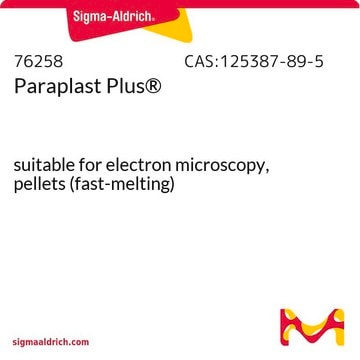P3558
Paraplast®
for tissue embedding
Synonym(s):
Paraffin – polyisobutylene mixture
Sign Into View Organizational & Contract Pricing
All Photos(2)
About This Item
Recommended Products
form
solid
mp
56-57 °C (lit.)
56-57 °C
application(s)
hematology
histology
storage temp.
room temp
Looking for similar products? Visit Product Comparison Guide
General description
Paraplast® is a paraffin–polyisobutylene mixture for tissue embedding and infiltration. It is a refined combination of highly purified paraffin with plastic polymers. It produces minimal tissue compression and wrinkle-free sections and cuts to 4 μm thickness with excellent ribbon continuity.
Application
Paraplast® has been used for tissue embedding and in the following applications:
- to screen major groups of vertebrates for the presence of cardiac smooth muscle and its phylogenetic distribution in terrestrial and aquatic turtles
- to study the relationship between membrane impedance and dendrite length of hippocampal neurons
- to compare the regenerative properties of human stem cells of the apical papilla as an alternative to other dental stem cells
Features and Benefits
- Minimal tissue compression.
- Produces wrinkle-free sections.
- Excellent ribbon continuity.
Other Notes
Double filtered paraffin wax in pellet form.
Legal Information
Paraplast is a registered trademark of Leica Biosystems
Storage Class Code
11 - Combustible Solids
WGK
WGK 3
Flash Point(F)
Not applicable
Flash Point(C)
Not applicable
Personal Protective Equipment
dust mask type N95 (US), Eyeshields, Gloves
Certificates of Analysis (COA)
Search for Certificates of Analysis (COA) by entering the products Lot/Batch Number. Lot and Batch Numbers can be found on a product’s label following the words ‘Lot’ or ‘Batch’.
Already Own This Product?
Find documentation for the products that you have recently purchased in the Document Library.
Customers Also Viewed
Diana B Sequeira et al.
Clinical oral investigations, 25(9), 5317-5329 (2021-02-26)
To compare the regenerative properties of human stem cells of the apical papilla (SCAPs) embedded in a platelet-rich plasma (PRP) scaffold, when implanted in vivo using an organotypic model composed of human root segments, with or without the presence of
Jessica N Witchley et al.
Cell host & microbe, 25(3), 432-443 (2019-03-15)
Candida albicans is a gut commensal and opportunistic pathogen. The transition between yeast and invasive hyphae is central to virulence but has unknown functions during commensal growth. In a mouse model of colonization, yeast and hyphae co-occur throughout the gastrointestinal
Positive Effects of Diphlorethohydroxycarmalol (DPHC) on the Stability of the Integument Structure in Diet-Induced Obese Female Mice
Chae-Lim Kim
Development & reproduction (2015)
Intestinal metabolism of weaned piglets fed a typical United States
or European diet with or without supplementation
of tributyrin and lactitol
or European diet with or without supplementation
of tributyrin and lactitol
A. Piva
Journal of Animal Science (2008)
Cristina Barrero et al.
Planta, 229(2), 235-247 (2008-10-03)
Transfer cells have specializations that facilitate the transport of solutes across plant exchange surfaces. ZmMRP-1 is a maize (Zea mays) endosperm transfer cell-specific transcriptional activator that plays a central role in the regulatory pathways controlling transfer cell differentiation and function.
Our team of scientists has experience in all areas of research including Life Science, Material Science, Chemical Synthesis, Chromatography, Analytical and many others.
Contact Technical Service












